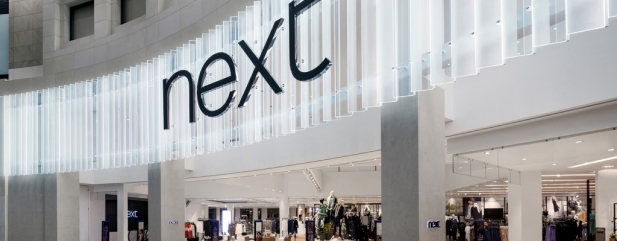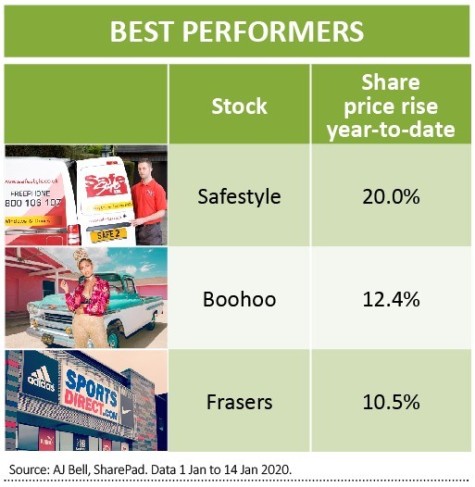Archived article
Please note that tax, investment, pension and ISA rules can change and the information and any views contained in this article may now be inaccurate.
Can the Christmas retail losers’ problems be fixed?

The kindest description you could give the post-Christmas trading updates from the retail sector would be ‘mixed’.
Some companies excelled, such as Next (NXT) maintaining its recent sales growth momentum, but others had a much harder time.
Next’s strong online sales and the robust sales growth at purely web-faced fashion firm Boohoo (BOO:AIM) suggests the internet continues to take business from the traditional high street, where the general trend was a fairly disappointing build-up to Christmas with lots of price cuts to draw in shoppers.
High street fashion brand Superdry (SDRY), which reported its festive trading on 10 January, appears to have been a victim of chief executive Julian Dunkerton’s decision to avoid price cutting. The result of a poor Christmas trading period was that profit for the current financial year could be wiped out entirely.
Home comforts
Sales of homewares appeared to be a bright spot this Christmas – specialist Dunelm (DNLM) posted a 5% increase in like-for-like sales supported by strong online growth. While in an otherwise mixed update from discount chain B&M (BME) ‘continued strength and outperformance across our Home Departments’ was flagged.
A company shouldn’t be judged on one trading period but Dunkerton is now around nine months into his comeback at the company and he will be under increasing pressure to demonstrate his attempts to boost margins and restore brand integrity are gaining traction.

Either, as Dunkerton argues, the brand has suffered thanks to too much discounting and/or some poor recent collections or its faux-Japanese products have lost their cachet with shoppers. The answer to this question will determine if its recent struggles are a short-term blip or signs of a longer-term decline.
LOST IN THE POST
Card Factory’s (CARD) struggles look far from short term. On 9 January it reported a poor update with sales growth seemingly coming from new store openings rather than organically.

The real damage to the share price came from the decision not to pay a special dividend. The company arguably painted itself into a corner by paying special dividends in the past so regularly that investors got used to them.
If sales continue to falter then the ordinary dividend could eventually hit the chopping block.
Selling gift cards and wrapping paper cheaply has been a lucrative business but there seems a real risk that people just aren’t sending as many cards as they used to and/or are resorting to online greeting cards.
RADICAL CHANGES NEEDED?
Another high street outfit struggling to stay relevant is Marks & Spencer (MKS). The story told by its latest trading statement is not a new one. Food is doing fine but the clothing and home business is not. There have been several attempts to fix this part of the business going back more than a decade but to date nothing seems to have worked.
Liberum suggests a possible, more radical solution: ‘In our opinion, Clothing & Home needs help from third party brands if it is to grow again. Introducing third party brands, and therefore offering increased choice to the customer, has proven to be an excellent growth driver to competitors such as Next.
‘Since November 2015, the number of brands listed on Next’s website has increased 68% to 737. Over a similar period, revenue from these third party brands has increased 106% while profits from them have increased 186% (margins have increased from 12% to 17%).’
How different parts of the retail sector fared
Clothing – BDO’s high street sales tracker shows the two week build-up to Christmas was very disappointing for fashion sellers
Home – the strongest category of growth according to BDO (fourth quarter +6.5%) supported by upbeat commentary from Dunelm and B&M
Electricals – Wasn’t great at both John Lewis and Argos, with gaming in particular suffering. Mike Coupe, Sainsbury’s CEO, said: ‘The gaming market was down more than 35%, impacted by an absence of new product launches’
Cards – Card Factory’s like-for-like sales declined by high single digits in November and December, with the company blaming weak consumer sentiment. This resulted in a lowered profit outlook
Toys – Weakness was flagged at both B&M and Sainsbury’s which called the category down by double digits for a second year in a row
DIY – Q4 is a seasonally small quarter. Weakness at SIG looked company-specific while Topps Tiles noted an improved exit trend to the quarter
With the pressures on the rest of the business, the launch of a food delivery service with Ocado (OCDO) later in 2019 really needs to go smoothly for Marks.
Important information:
These articles are provided by Shares magazine which is published by AJ Bell Media, a part of AJ Bell. Shares is not written by AJ Bell.
Shares is provided for your general information and use and is not a personal recommendation to invest. It is not intended to be relied upon by you in making or not making any investment decisions. The investments referred to in these articles will not be suitable for all investors. If in doubt please seek appropriate independent financial advice.
Investors acting on the information in these articles do so at their own risk and AJ Bell Media and its staff do not accept liability for losses suffered by investors as a result of their investment decisions.

 magazine
magazine








